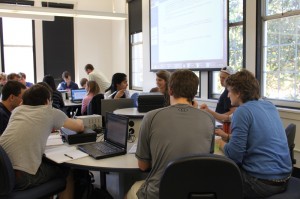
SCALE-UP classrooms in physics turn a traditional lecture class into a workshop setting. (Photo by Kristen Chavez)
Carolina has been named a project site for the Association of American Universities’ (AAU) five-year initiative to improve the quality of undergraduate education in science, technology, engineering and mathematics (STEM) fields at its member institutions.
UNC-Chapel Hill is one of eight campuses nationwide to each be awarded $500,000 over the next three years as part of a $4.7 million grant from The Leona M. and Harry B. Helmsley Charitable Trust. The University will commit nearly $1.3 million over the same period to transform its gateway courses in biology, chemistry and physics in the College, preparing more students for careers in fast-growing STEM fields. Mike Crimmins, former senior associate dean for natural sciences and the Mary Ann Smith Professor of Chemistry, led a group of faculty who contributed components of the STEM proposal.
The project bolsters an ongoing initiative in the College to enhance undergraduate education through the use of innovative, student-focused instructional techniques and technologies.
The enhancement of STEM courses began about 10 years ago with the redesign of the introductory physics course. The department of physics and astronomy later launched the use of the new SCALE-UP model, which turned a large traditional lecture class into a workshop setting.
These advances have evolved into what are known as “flipped” classes, where students are expected to master some course content before coming to class, by completing guided reading assignments, viewing lectures and presentations on videos, and/or completing online modules and homework. During face-to-face classes, students engage primarily in interactive activities.
The College has piloted such courses in biology, chemistry, physics, psychology, entrepreneurship and global cinema, and has plans for adding similar classes in other areas.
Future plans include hiring additional science education lecturers, and working with UNC’s Center for Faculty Excellence to redesign traditional lecture courses and train a network of junior and senior faculty to teach the re-engineered courses.
